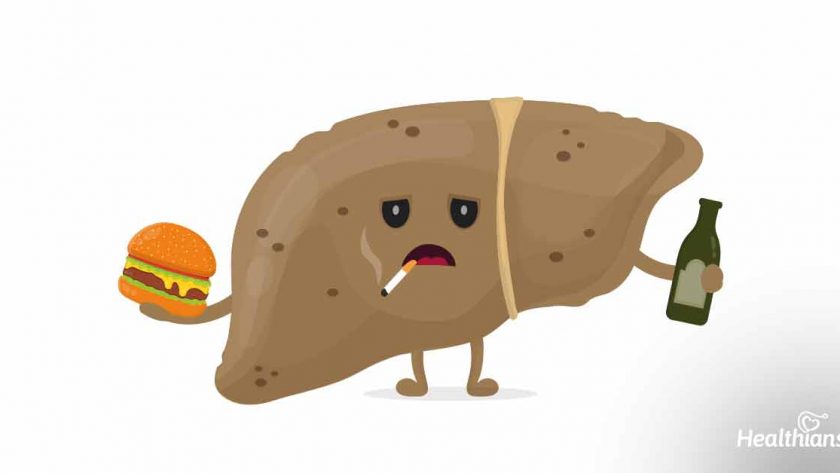[ad_1]
Contributed by: Rachana Arya
Liver and its importance
Are you munching on French fries and burgers while reading this? Or maybe sipping that extra cup of latte, a cappuccino, or maybe enjoying a pint of beer this very minute? If you are doing so, please stop! You’re damaging your liver!
Without question, the liver is the second biggest organ in the human body that performs nearly 500 functions to ensure that the body is healthy and fit. It works hard around the clock to digest, absorb, and process food, maintain your cholesterol level, fight infection, and assist digestion, among other important liver activities. Unfortunately, liver illnesses do not present any signs or symptoms until they have progressed to an advanced level.
Liver diseases are more common than people realize. Doctors are reporting an alarming rise in the number of people with fatty liver, which is a concerning development because the fatty liver can cause liver damage and even cancer.
The good news is that, contrary to other organs, the liver is one of the few organs in the human body with a significant regenerative capacity and the ability to mend itself if appropriate and timely intervention is carried out. Take that Wolverine!
In this article, we highlight some myths about fatty liver you shouldn’t believe.
Myth #1: Only alcoholics suffer from fatty liver
Fact:
Alcoholic beverages contain toxins that can cause serious liver cell damage and scarring. While the disease usually manifests itself after a period of intense drinking, it can also manifest itself in people who are not alcoholics. Alcohol is only one of the many causes, and the risk depends on how much you drink and over how long a period
Other potential causes include:
- Consumption of high-fat, high-sugar diet
- Obesity
- Insulin resistance
- High levels of fat in the blood
- Family history of fatty liver illness
Myth #2: Occasional alcohol is allowed even if you have fatty liver
Fact:
Long-term alcohol abuse. To avoid putting your body at risk of fatty liver, it is recommended to avoid alcohol usage because even a little amount can accelerate the damage.
Myth #3: Only obese people develop fatty liver
Fact:
Although fatty liver disease is more common in obese people, it can also occur in thin people. Present studies point to equal risk for both obese and lean people. Fatty liver can be caused by a variety of factors, including drugs, alcohol consumption, infection, and genetic and metabolic problems.
Myth #4: Fatty liver is a disease of the west, not common in India
Fact:
Unfortunately, Nonalcoholic Fatty Liver Disease (NAFLD) is emerging as a major problem worldwide, affecting both developed and developing countries alike. In India, there has been a paradigm shift in the dynamics of liver cirrhosis, with over 10 lakh new cases identified each year!
Myth #5: Fatty liver affects only older people
Fact:
Sadly no! In fact, it is becoming more widespread than ever among young people. Liver illness can start in childhood and be genetically passed down the generations. However, the vast majority of patients are in their 40s and 60s.
Myth #6:Fatty liver is not a big health concern
Fact:
Fatty liver is a complicated issue that can signal a wide range of metabolic problems, including heart disease, high blood pressure, diabetes, renal disease, sleep apnea, cancer, and more, as well as an increased chance of cirrhosis and liver cancer.
Myth #7: Fatty liver is irreversible
Fact:
Alcohol-induced fatty liver can be reversed if the person stops drinking. The liver has a remarkable ability to self-heal. Helping the liver bounce back and return to an optimal state of health involves certain lifestyle modifications, weight reduction, regular exercise, a healthy diet, control of blood sugar and cholesterol. Eating a healthy diet with plenty of fresh citrus fruits, green vegetables, foods high in fiber, and whole grains can make a big difference in reversing the damage to the liver.
Myth #8: There is no need to consult a liver specialist
Fact:
Fatty liver is a complex condition that should be evaluated by an expert like a gastroenterologist or hepatologist. To determine the damage, they will do a thorough examination and tests that can quantify liver fat and fibrosis.
Conclusion
It should go without saying that taking care of your liver is critical; it is past time to pay attention to this often-overlooked but vital organ and improve its performance.
Check Your Liver’s Health Today
This post has already been read 23 times!
[ad_2]
Source link




